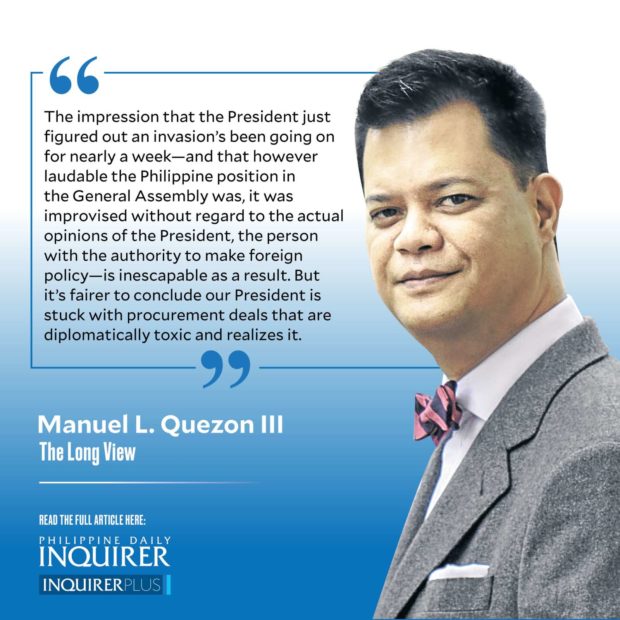Ukrainian surprise
Sometimes we have to be reminded that we still have a president. Yesterday provided one such reminder. The morning after the Philippines joined the majority of the United Nation’s members in condemning Russia’s invasion of Ukraine, the President made a rare daytime manifestation, summoning military, police officials, and businessmen to discuss “what’s happening in Europe … so that we can come up with a sensible front on how to handle this thing.” The impression that the President just figured out an invasion’s been going on for nearly a week — and that however laudable the Philippine position in the General Assembly was, it was improvised without regard to the actual opinions of the President, the person with the authority to make foreign policy — is inescapable as a result. But it’s fairer to conclude our President is stuck with procurement deals that are diplomatically toxic and realizes it.
This would take the teeth out of what’s left of his so-called foreign policy, one that for a while seemed to have a second wind. On the 26th, there was a Twitter chorus hailing the President for his “independent foreign policy,” insisting that the US and NATO are both untrustworthy. The next day, a long text message was circulating pitying the Ukrainian leader who was helpless in the face of Russia decimating his air and ground forces while the West did nothing. Putin, the message said, had brilliantly called Washington’s bluff. “Let this be a lesson for Taiwan and for the leaders of other sovereign nations that habitually tag onto America’s apron string or behave like sick poodles kissing the US President’s hand. They should realize by now it could be a costly kiss. I hope Philippines and Taiwan will not be another victim.”
Writing in The Atlantic, Michael Schuman concluded, “the war for Ukraine is the most unfortunate indication yet of the frightening direction of global geopolitics: Autocrats are striking back.” For this reason, he wrote, with autocrats on the offensive and democracies being defensive, all eyes must turn to Taiwan, the independence of which is intolerable to Beijing.
Then again China can afford strategic patience; time is on its side. But if the trend of world events, at least when Russia’s Ukrainian adventure began, seemed on the side of the bold, it had to demonstrate its core aims. Last Tuesday, the People’s Liberation Army of China’s Eastern Command said it had conducted landing drills in an undisclosed location in the East China Sea. Last Thursday, Taiwan announced it detected nine Chinese fighters entering its air defense identification zone. And what minor saber-rattling achieved, popular rhetoric could amplify.
When the G7 made a call to support Ukraine, the Global Times, a tabloid owned by the Chinese government, tweeted (“mockingly,” The Economist said): “When China takes action to eradicate [the] secessionist regime in Taiwan, you must also give China unwavering support.” A dual-messaging effort seems to have been decided. Official organs such as the People’s Daily, which didn’t condescend to even mention the goings-on in Ukraine (perhaps “reflecting the reluctance of China’s leaders to take a clear stance on it,” opined the Wall Street Journal, which pointed out, however, that discussions on Weibo more vigorously supported Russia and mocked the West).
In the end, both China and India decided not to burn their bridges with Russia and pointedly abstained in a United Nations Security Council vote condemning Russia. Yet China senses where global opinion lies; even as the UN General Assembly debated on whether to condemn Russia, news items variously reported that China wasn’t helping Russia to evade sanctions (Reuters), that China’s state banks were restricting the financing for Russian commodities, and that it was pausing Russian seaborne crude purchases (both in Bloomberg). Also on Monday, Beijing blandly stated “China and Russia are comprehensive strategic partners of coordination. Our relationship features non-alliance, non-confrontation and non-targeting of any third party.” But American senior White House coordinator for Indo-Pacific policy Curt Campbell described the real score as “right now, China is occupying an awkward nexus in which they’re trying to sustain their deep and fundamental relationship with Russia.” The United States for its part sent a message by sending a delegation of former defense officials to Taipei even as it insisted it would keep communications channels open with Beijing. Obligingly, Taiwan in turn has taken to downplaying any potential Chinese threat, emphasizing the talking point that its situation is different from Ukraine’s.
















